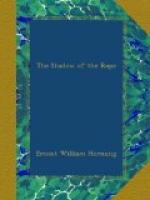5. Attended Mrs. M.’s trial throughout,
thereafter making her
acquaintance and offering
marriage without any previous private
knowledge whatsoever of her
character or antecedents.
POSSIBLE MOTIVES
—— ——
—— is a human mystery, his past life
a greater one.
He elaborately pretends that no part of that past
was spent in
Australia.
M. said he knew him there; also that “he’d make him”—pay up!
Blackmail not inconsistent with M.’s character.
Men have died as they deserved
before to-day for threatening
blackmail.
Possible Motive for Marriage
Atonement of the Guilty to the Innocent.
As Langholm read and re-read these precise pronouncements, with something of the detachment and the mild surprise with which he occasionally dipped into his own earlier volumes, he congratulated himself upon the evidently lucid interval which had produced so much order from the chaos that had been his mind. Chaotic as its condition still was, that orderly array of impression, discovery, and surmise, bore the test of conscientious reconsideration. And there was nothing that Langholm felt moved to strike out in the train; but, on the other hand, he saw the weakness of his case as it stood at present, and was helped to see it by the detective officer’s remark to him at Scotland Yard: “You find one [old Australian] who carries a revolver like this, and prove that he was in Chelsea on the night of the murder, with a motive for committing it, and we shall be glad of his name and address.” Langholm had found the old Australian who could be proved to have been in Chelsea, or thereabouts, on the night in question; but the pistol he could not hope to find, and the motive was mere surmise.
And yet, to the walls of the mind that he was trying so hard to cleanse from prejudice and prepossession—to school indeed to an inhuman fairness—there clung small circumstances and smaller details which could influence no one else, which would not constitute evidence before any tribunal, but which weighed more with Langholm himself than all the points arrayed in his note-book with so much primness and precision.
There was Rachel’s vain appeal to her husband, “Find out who is guilty if you want people to believe that I am not.” Why should so natural a petition have been made in vain, to a husband who after all had shown some solicitude for his wife’s honor, and who had the means to employ the best detective talent in the world? Langholm could only conceive one reason: there was nothing for the husband to find out, but everything for him to hide.
Langholm remembered the wide-eyed way in which Steel had looked at his wife before replying, and the man’s embarrassment grew automatically in his mind. His lips had indeed shut very tight, but unconscious exaggeration made them tremble first.
And then the fellow’s manner to himself, his defiant taunts, his final challenge! Langholm was not sorry to remember the last; it relieved him from the moral incubus of the clandestine and the underhand; it bid him go on and do his worst; it set his eyes upon the issue as between himself and Steel, and it shut them to the final possibilities as touching the woman in the case.




